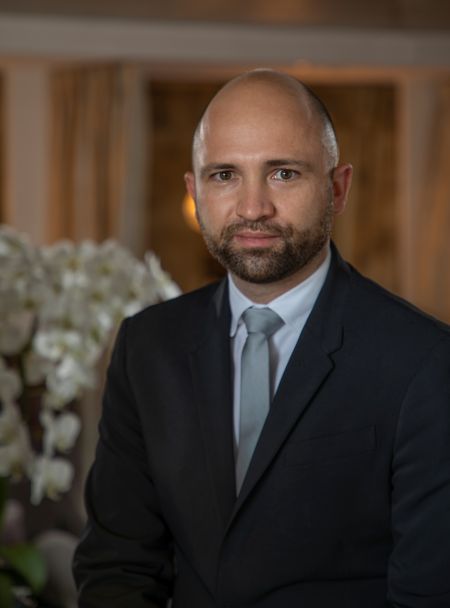 |
INTERVIEW – FRÉDÉRIC ZEMMOUR, GENERAL MANAGER, L’ERMITAGE BEVERLY HILLS IN LOS ANGELES: "THE BIGGEST CHALLENGE IS BALANCING OPERATIONAL DISCIPLINE WITH EMOTIONAL LEADERSHIP" (United States)
From excellence to instinct, the General Manager of L’Ermitage Beverly Hills advocates a vision of luxury based on precision, team culture, and a constant presence on the floor. |
Category: North America & West Indies / Carribean islands - United States - Interviews and portraits
- Interviews
Interview made by Vanessa Guerrier-Buisine on Tuesday 22 July 2025
 Frédéric Zemmour, General Manager of the Ermitage Beverly Hills Hotel
Photo credit © L'Ermitage Beverly Hills
It was back in high school, during a summer job at a hotel in London, that he fell in love with hospitality. The attraction was such that he chose to pursue a degree at the hotel school Vatel Lyon before embarking on an international journey. His first experience took him across the Atlantic for an internship in Florida, which left a strong impression on him, as he promised himself he would “return one day to work in the U.S.”. With that goal in mind, he first trained at the Plaza Athénée in Paris during a second internship, then flew to Los Angeles to complete an MBA at Vatel Los Angeles.
Amid the economic crisis, an opportunity took him to New Zealand, and in 2009, Vatel finally opened the doors to the American dream through an internship at the Sofitel in West Hollywood. He would stay there for 11 years, progressing from Assistant Restaurant Manager to Director of Outlets. In 2019, he joined L’Ermitage Beverly Hills as Director of Food & Beverage. When the hotel was acquired by EOS Hospitality in 2020, he was promoted to Hotel Manager, and then General Manager in early 2024. This step-by-step path is grounded in a structured culture inherited from Accor and a constant drive to learn and develop his teams.
“Leading a team is always done from within,” he says. In his view, leading by example, listening, and emotional intelligence are central to leadership. At the helm of a five-star hotel recognized by the Forbes Travel Guide and AAA Five Diamonds, he works to create a shared culture of excellence, valuing each team member and encouraging initiative. Far from remote management, he stands for a leadership style that is present, accessible, and engaged. Based in Los Angeles for more than fifteen years, Frédéric Zemmour has found in the city an energy and diversity he considers essential.
In this interview with Journal des Palaces, he discusses his role as General Manager, the philosophy he instills in his teams and guests, and shares his most valuable advice for a successful career in luxury hospitality.
Journal des Palaces: After nine years with Sofitel, you are now running an independent hotel. How does your experience within a group like Accor influence your current thinking and decisions?
Frederic Zemmour: Working at Accor provided me with a deep understanding of structure, systems, and processes. Those tools are invaluable for decision-making. At an independent hotel, the processes are simpler, and decisions can be made more quickly. Both environments have their strengths, but my structured background with Accor continues to shape my approach today.
L’Ermitage is not affiliated to a hotel brand, but it does belong to the EOS Hospitality group. What is your relationship with the group's teams, and with the GMs of the other properties?
When I joined EOS, they had only 17 hotels. It was a tight-knit group. We have an annual GM conference where we collaborate and brainstorm. Today, EOS has grown to about 57 hotels in just four years. Despite this growth, the team remains collaborative. We’re close with the corporate team, many of whom are new because of the rapid expansion. It’s a great team to work with, and EOS is a fantastic company.
You've been based in Los Angeles since 2009. What specifically prompted you to set up permanently in the United States?
I fell in love with LA. It’s dynamic and constantly changing–there’s no chance to get bored. The diverse mix of cultures, the weather, the food scene, all of it drew me in. Yes, the traffic could be better, but otherwise, it’s a city I can’t imagine leaving.
Your property has been awarded five stars in the Forbes Travel Guide and AAA Five Diamonds. How does the culture of excellence and attention to detail guide you on a daily basis? How do you create ‘magic’ every day?
It all comes down to our team. We prioritize a five-star culture internally, so our team feels valued and empowered to deliver five-star service. I tell my team: if I don’t show up, no one notices, but if a guest-facing team member is absent, it impacts everything. Our goal is to create an exceptional work environment where our staff feels inspired to create magical experiences for our guests.
Do you provide specific trainings for your teams?
Training is at the heart of everything we do. At the luxury level, service isn’t just about procedures, it’s about emotional intelligence, timing, and intuition. We provide detailed, ongoing training across all departments, not only on technical standards, like Forbes and AAA protocols, but also on service philosophy, guest personalization, and cross-department collaboration.
We hold daily stand-ups, department-specific service refreshers, and one-on-one coaching. But just as important as formal training is real-time feedback. We walk the floor together, celebrate great moments, and turn missed opportunities into teachable moments. Our goal is to make excellence instinctive.
Do you have examples of that magical experiences you provide for your guests?
As for magical experiences, one of my favorites involved a guest who mentioned in passing that they were celebrating their anniversary and had gotten engaged in Italy. By the time they returned to their suite after dinner, our team had arranged for a handwritten note in Italian, a bottle of the same wine from their engagement trip, and framed photos of that vacation that we sourced from their social media (with discretion and care). They were speechless.
That kind of magic doesn’t happen by accident. It happens when you have a team that listens closely, thinks creatively, and feels empowered to act with heart. Training builds the foundation–but it’s culture that brings it to life.
How do you see your job as General Manager? What do you see as the greatest challenges of this role?
Leading a team is always done from within. A quote I live by, from Edward Mady, says: “Leadership doesn’t elevate you above others; it makes you responsible for others. It makes you the custodian of a reputation and a culture.” That sums up how I approach my role: guiding the team and protecting our culture.
Can you give some examples of challenges or actions that you might take as a GM?
I see the role of General Manager as both guardian and guide. My job is to protect the culture, inspire the team, and ensure that every detail, from service to profitability, is aligned with our purpose. At this level of luxury, you’re not just managing a hotel; you’re curating a feeling–every hour, every day, for every guest.
The biggest challenge is balancing operational discipline with emotional leadership. You’re expected to be deeply involved in the numbers, labor models, GOP margins, RevPAR, but also emotionally available for your team and your guests. That means being just as comfortable in the P&L as you are handling a difficult guest recovery or supporting a team member going through a hard day.
Another challenge is consistency at scale. Guests today expect bespoke, highly personalized experiences, but in a 5-star environment, that has to happen every single time. That’s not easy. It requires relentless training, clear communication, and empowering your team to think and act with autonomy.
For example, I once stepped in to greet a guest whose luggage had been delayed and who was clearly frustrated. Within minutes, our team had arranged emergency shopping assistance, pressed and delivered new clothes to their room, and sent a note from me personally, along with a complimentary spa treatment. That kind of seamless response only happens when your team feels trusted and prepared.
Ultimately, the greatest challenge, and privilege, is to be the person who makes 200 moving parts feel like one smooth, silent engine. When we do our job right, it looks effortless. But behind the curtain, it’s a daily choreography of discipline, creativity, and care.
What practical tips would you give to a young person, or a seasoned professional, who wants to move to Los Angeles to make a success of their career?
Don’t live too far from your workplace and don’t rush your career. You gain true experience by working all aspects of hotel operations. During COVID, our team shrank to just nine people, we had to do everything from cleaning rooms and folding laundry, to staffing the front desk. That experience taught me more than any title could. If you don’t do it, you don’t realize how hard it is. Be on the ground with your team and listen. The team usually has 90% of the answers.
Could you be more specific, as the question is related to moving to LA?
- Live strategically, proximity matters. LA is vast, and commuting across the city can drain your energy before your shift even starts. If you're serious about a hospitality career, live close to your hotel or in a neighborhood with direct access to your property. Being consistently on time and fully present is non-negotiable in luxury service.
- Understand that luxury is in the details. Success in luxury hospitality isn’t about flashy branding–it’s about the invisible touches: a perfectly pressed bedsheet, remembering a guest’s preferences, or anticipating needs before they’re voiced. Get obsessed with detail. It’s what separates good service from exceptional hospitality.
- Be willing to do every job. Whether you’re coming in as a management trainee or a department head, never be above the work. During the pandemic, our team was reduced to just nine people–we all did everything: housekeeping, laundry, front desk, room service. Those experiences gave me a real understanding of our operation and built deeper respect with the team. In LA, humility and hustle are noticed.
- Network with purpose, but stay grounded. This city thrives on relationships, but authenticity matters. Connect with people who share your values and work ethic. Join industry associations, attend hospitality events, but don’t just “collect contacts”, build meaningful professional relationships.
- Know the market. LA luxury hospitality is unique–it blends Hollywood glamour with wellness, discretion, and global cultural influences. Understand who your guests are, from entertainment executives to international travelers to high-net-worth locals. Tailor your service style to what luxury means to them.
- Be on the floor. Listen. Lead with Empathy. Whether you're in a five-star hotel in Beverly Hills or a lifestyle property in West Hollywood, leadership in hospitality is earned by presence. Your team usually has 90% of the answers, you just need to listen. Lead from the ground, not from behind a desk.
- Play the long game. Titles come and go, but reputation is everything. In luxury hospitality, how you treat people, guests, colleagues, vendors, will follow you across this tightly knit industry. Take your time. Master each role. The respect you earn will open the doors you’re aiming for.
What advice would you give to a young person looking for a career in the luxury hotel industry?
Luxury is all about details and anticipation. It’s not just about the product – it’s the experience. Take a bartender, for example: making a drink is only 40% of the luxury. The story behind it, the interaction, the ambiance, that’s where luxury lives.
In rooms, the bed may be great, but the experience is elevated by warm greetings, personal touches, and anticipating needs. If a guest checks in with kids, we offer them age-appropriate activities. If they mention a morning meeting, we ask if they need help printing a presentation or arranging a car. That’s luxury, giving people time back to focus on what matters.
|
|







